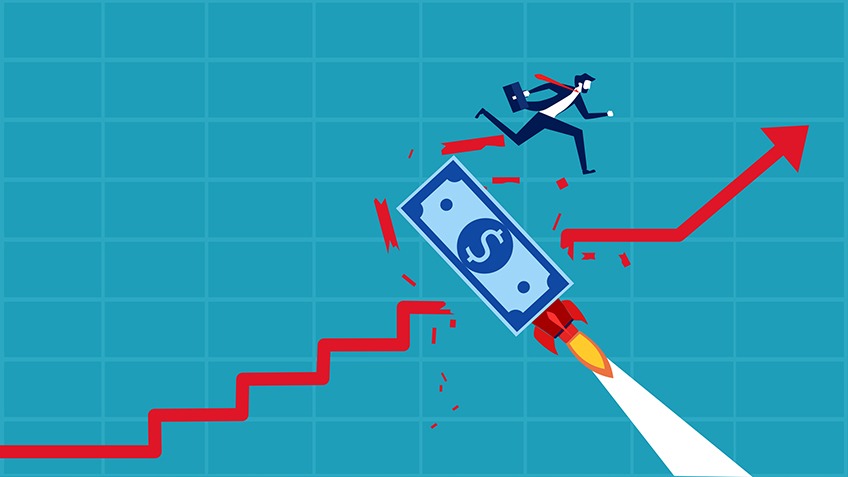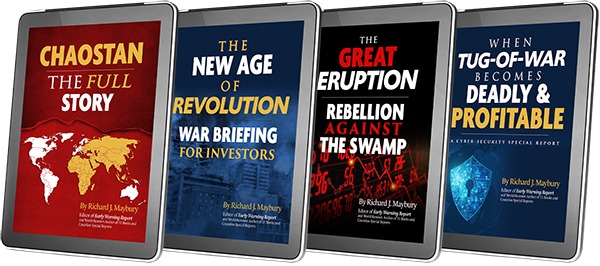 Our recent article, “The Fed’s Disaster Has Arrived” got some great responses. Readers agreed, the Fed’s high inflation is a disaster; investors have some real challenges protecting their money. Cash is no longer a store of wealth, but rather an asset depreciating rapidly.
Our recent article, “The Fed’s Disaster Has Arrived” got some great responses. Readers agreed, the Fed’s high inflation is a disaster; investors have some real challenges protecting their money. Cash is no longer a store of wealth, but rather an asset depreciating rapidly.
Richard Maybury’s recent “US & World Early Warning Report” outlines the challenges. He offered six options and discussed them in depth.
Richard begins:
“To my mind, the long-term outlook screams runaway inflation. But before we get there, a recession seems more likely every day, as the Fed seems bent on a further temporary tightening.
What to do?
I can think of six options:
1. Sell everything and go to cash.
2. Rebalance your portfolio for “all weather” stocks that usually do well in downturns.
3. Rebalance your portfolio for stocks that are part of major trends that are largely insensitive to the economy because they are supported by the government.
4. Buy “Inverse” funds that go up when the stock market goes down.
5. Sell Stocks Short.
6. Buy high-quality blue-chip dividend stocks while they are selling at discounts.”
I want to discuss these options with our friend and guru, Chuck Butler, editor of the Daily Pfennig. (A FREE publication, I highly recommend.)
DENNIS: Chuck, thanks again for your time. Richard offered investment options. Our readers always welcome your opinion. Let’s go one at a time.
Richard considers #1 financial suicide as runaway inflation will clobber your buying power. Using the real number, if you have $1 million in cash, you will lose $160,000 in buying power annually because of inflation.
Holding cash in reserve to grab some bargains is recommended, but this appears to be a fine line.
Chuck, how do you feel about this?
CHUCK: Yes, I agree to a point about holding cash…. First, you need cash for gas, groceries, and giggles, right? Also, having an extra amount of cash for things needed is always a good idea…. No reason to have to sell that stock you love, to pay for a new air conditioner…. Or, a stock that your brother in law tells you is a “sure thing”….
Humor intended in some of these ideas, but the gist is real, that cash in your account can be a HUGE asset that you can put to work instantly should the need arise. However, having a HUGE amount in cash can also be a liability.
There are some safe investments, that combat inflation and your portfolio should include them as an offset…. (Got Gold?)
DENNIS: Richard feels #2 contains less risk. During hard times, people change their buying habits and look for bargains. Some retailers cater to “discount shoppers.”
No one can time the market consistently. Richard says, “I looked at the ten bear markets since 1961; none lasted more than 21 months.”
Holding stocks that are under water for months is not easy. Might investors be under stress if stock prices continue down?
CHUCK: Some companies can increase profits during hard times. As they continue to beat Wall Street estimates, they look more attractive and may rebound more quickly than others.
Seasoned investors have learned to “fight the panic.” By that I mean to not check the stock prices every day, if you know that you’re not going to sell during this downturn in stocks!
When some investors panic, having cash makes it easier to go shopping for bargains.
DENNIS: Richard feels #3 is less risky, “Much of the U.S. infrastructure is financed by government and has become the sacred cow in DC.” He mentions a couple of choices, calling them, “pork barrel winners.”
How do they perform in bear markets?
CHUCK: Dennis, I tell readers I am not a good choice for a stock jockey. Having said that, I feel that the consumer staples companies, and utilities, generally do well in downturns. Companies with long histories of dividend growth may remain very attractive when seemingly everything is selling off.
There are certain “pork barrel” industries; particularly those which must survive for our nation, that the government will protect. That means there is probably a floor under their downside. I’m sure the government would not let certain defense contractors go belly up.
DENNIS: Richard is unique. He does a tremendous amount of research, is a historian, educator and logical thinker who relates current events to investment opportunities. His subscribers pay for his advice. I am not revealing his current recommendation. …. My readers know I am NOT a stock picker either.
Richard adds, “Unless you are a highly experienced speculator, #4 and #5 are almost as risky as #1, because timing is crucial.”
I disagreed with his ranking here. If you sell short and the stock takes off, there is no limit on your risk.
As to “inverse” funds, the fund manager makes all kinds of high-risk choices to produce a profit. If they make a mistake, the investor can lose a lot of money. Inverse funds are not for me.
How do you feel?
CHUCK: Dennis, I agree, you are protecting your life savings and the risks are just much too great.
If you want to bet on market direction, puts and calls offer great profit opportunities, while limiting risk. This is speculation and you better know what you are doing. Smart investors always want to minimize their risk.
I used to run a margin dept. in a regional brokerage house many years ago. I’ll always remember having to call clients that shorted stocks to tell them their account was sold out to cover the short sale loss. Selling good investments to cover losses on bad investments is very expensive. While it hasn’t happened often today because of the Fed’s easy money, and currency printing, it will happen again….
DENNIS: Richard says, “(#6) is my favorite choice: During market plunges, prices of high-quality blue-chip stocks are rarely driven below book values. This is likely because these firms are so well run, they almost never go under, so buying them at depressed prices is very low risk.”
Personally, I look for companies where dividends are unlikely to be cut. Buying low not only gives you asset appreciation, but also great dividend yields.
What do you look for?
CHUCK: I agree, this as a great option. I want to caution readers that some “old” household blue chip stocks are now suspect. They borrowed cheap money to buy back their stock and pay special dividends and award themselves nice bonuses. Those debts are coming due. They will see much higher interest rates when they roll over their debt.
Some may cut their dividends “because everyone else is doing it”, so they can increase them later, making their stocks appear more attractive.
I look for stability and a long history of maintaining and raising their dividends. The slang term is “dividend aristocrats.”
Investors must do their research. You can’t assume a 100+ year old company is what it used to be. Online brokers like Schwab have great research tools, so do your homework before you invest.
You may not time the market perfectly, but don’t panic, and you will be well rewarded.
DENNIS: One final question. About market timing…. Richard adds,
“The bureaucrats in the Fed will decide this, and they aren’t talking, at least not to those of us who have no political connections.
…. Fed officials clearly have a humongous long-term inflationary bias. If a deflationary situation scares them badly enough, they will almost certainly do all they can to inflate us out of it ASAP.”
Chuck, we have both said the political class and Fed are unlikely to have the courage to see this through. Have you changed your opinion?
CHUCK: Not one iota Dennis! The deflationary aspects of soaring inflation are already showing up…. Oil prices have declined, lumber prices have too, along with the price of copper.
I’m still of the opinion that after the July rate hike, that the Fed Heads will think, “We’ve done enough to combat inflation and deflation is coming, so we had better stop and let the previous rate hikes work their way through the economy, before we do anything else”
 Soon after the Fed Heads turn around and start cutting rates, printing currency and start the whole shootin’ match over again – they still don’t believe that their easy money, and currency printing had anything to do with our inflation mess!
Soon after the Fed Heads turn around and start cutting rates, printing currency and start the whole shootin’ match over again – they still don’t believe that their easy money, and currency printing had anything to do with our inflation mess!
I also feel the government doesn’t have the courage to get spending under control. Free market interest rates will clobber the government and their attempt to spend freely for their special interests.
Bottom line, they will attempt to get the economy going and the mess will eventually get bigger.
Dennis, thanks again for the opportunity to opine for your readers, I enjoy it.
DENNIS: On behalf of our readers, thank you for your time.
|
Some Great News! The Early Warning Report is a unique newsletter that I highly recommend. Richard J. Maybury educates us and offers investment advice you will not find elsewhere. Richard has put together a special offer for “Miller On The Money” readers. The package includes a one-year subscription to Early Warning Report (10 issues) and four special reports free, a $140 value.
|
I fear Chuck is right. Despite the tough talk, the government and Fed does not have the courage to allow a return to a true free market. Richard felt we will have a recession, followed by runaway inflation.
This could lead to some real political, economic, and social problems lasting for decades. In the meantime, Richard outlined the options that will help keep savvy investors afloat during the hard times.
Don’t panic, the bargains will appear!
For more information, check out my website or follow me on FaceBook.
Until next time…
Dennis
“Economic independence is the foundation of the only sort of freedom worth a damn.” – H. L. Mencken
Affiliate Link Disclosure: This post contains affiliate links. If you make a purchase after clicking these links, we will earn a commission that goes to help keep Miller on the Money running. Thank you for your support!






I always find it weird how the higher the ‘market’ goes, the more we hear how badly it is crashing.
What you’ve heard is how badly it will crash (future) when it finally does crash.
But you BTFD forever if you want.
rule #1 -don’t lose money.
rule#2 -see rule #1
Step 1a…do not invest what you cannot lose.
I will just buy more silver, guns, ammo, food, and other prepping supplies. At this point those are the real investments for surviving what is to come.
A person can go into walmart and with a $100 dollars and buy enough fishing gear such as lures and hooks to last them forever. Was in there yesterday and the one here is chocked full of that sort of thing. In real tough times wonder what some hooks and line would be worth? What would a string of bream be worth, gold wise? A bamboo pole and some worms verses an ounce of gold. Nothing smaller? Sorry, can’t make change.
People need to get realistic about their thinking.
That falls under prepping supplies. I have enough fishing supplies to supply a small army. I can go one further…mutiple ponds with fish in them.
Hey Dick!! What about the last time we were in a bonafide (if not somewhat engineered) 4TH TURNING CRASH?
That was October 1929, and even with the entire country getting mobilized for a war economy post 1939, the stock market didn’t get back to its previous crash highs til 1954, well into the post war years.
Added to this, we’re at the END OF AN AGE where many unthinkable things will happen. Paging the Book of Revelation — there likely won’t even be anything like a stock market in a decade or two.
Amen.
I have a large piece stuck in Roth doing nothing since I went to cash a few months ago. I think I am going to start nibbling. S&P 500 is up 8% since mid June. That’s about as safe as one can be and still be invested. The Euro being at or near parity has my interest as well, that would be bottom feeding.